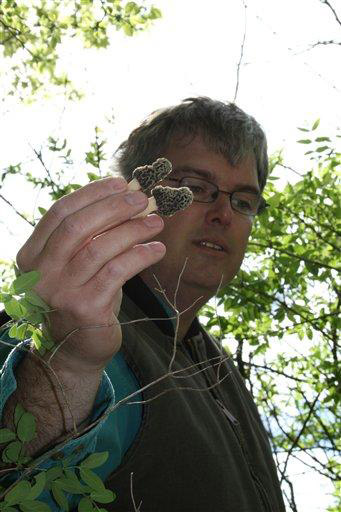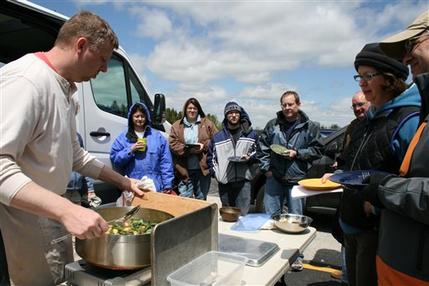Sara Wong, 33, also from Milwaukee, has taken Indian, sushi and Thai cooking classes. On a trip to Vietnam, she ate dog.
"I'll try just about anything," Wong said. She learned about Swanson's school at a community supported agriculture, or CSA, fair. "I like unique experiences in food, so I thought this would be fun."
Many of Swanson's classes are taught on CSA farms. The farmers sell shares of their crop in the spring, often for $500 or $600, and then deliver boxes of produce weekly during the growing season.
Typically, about a third of Swanson's students are CSA members eager to learn how to prepare the food they're receiving. Others are foodies, and some just want a new experience.
"The farmer will talk about what they're growing, what their practices are," Swanson said. "People will ask questions about what they are growing in their garden, how it pertains to them."
He varies the menu to reflect the season and the farms' specialties. A previous class at Pinehold Gardens, just outside Milwaukee, featured garlic, greens and fingerling potatoes. This year's class will be in August and focus on heirloom tomatoes.
Swanson also plans classes at a creamery near Madison and a wheat field on Washington Island in Lake Michigan. On the Washington Island trip last year, he showcased the wheat with a panzanella salad made with wheat bread, cucumbers, tomatoes, red onion, olives and feta and scones made with granola from the hotel where students stayed. He also used locally-made Death's Door Vodka to create vodka-braced strawberries with cream fraiche.
It was a great adventure, hauling cooking materials into the field in an old pick up truck, Swanson said. But, "wheat is just beautiful, just looking at the wheat in the wind is nice."
For those more interested in eating than cooking, Swanson hosts a series of Sunday dinners at farms. Guests receive quick tours of greenhouses or strawberry patches before settling down to meals that may include roasted chicken, strawberry shortcake or grilled summer squash.
Dress is casual, and "the big thing," Swanson said, is "breaking the bread, talking with the farmer about the things they are growing."
In all cases, he tries to keep the food simple so students or dinner guests can make similar meals at home.
"The idea is to get more people to cook," Swanson said, "and if they make the connection to the farmer, some of the best meals I've had are simple meals."
If You Go...
BRAISE CULINARY SCHOOL: http://www.braiseculinaryschool.com/ or 414-241-9577. Days and class times vary. The 2009 season runs through the end of September. Classes and dinners cost about $50, although all-day events may be more. |















